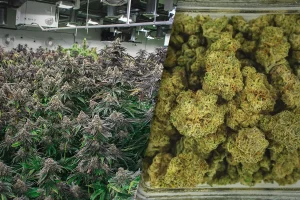
Mastering the Cannabis Harvest: Pro Tips for Cutting, Trimming, Curing, and Storing Your Crop
The harvest season is the most anticipated time for cannabis growers — when months of careful cultivation finally pay off. But cutting down the plants

In a landmark moment in history, the United States has officially begun taking steps to reschedule cannabis, marking a significant shift in U.S. drug policy. This move comes after years of advocacy, research, and shifting public perceptions surrounding the plant. However, the ramifications of this decision extend far beyond legal technicalities, affecting various aspects of society, the economy, and healthcare.
Rescheduling cannabis alters its legal classification under the Controlled Substances Act (CSA), potentially paving the way for decriminalization or legalization at the federal level. While the DEA’s action wouldn’t legalize cannabis outright, it signals a departure from its previous stance and could catalyze legislative reforms. States that have legalized cannabis for medical or recreational use may experience further legitimization and normalization of their policies.
The rescheduling of cannabis opens doors to a burgeoning industry, offering vast economic opportunities. From cultivation and manufacturing to retail and ancillary services, the cannabis sector is poised for growth. Investors, entrepreneurs, and job-seekers are eyeing the industry with renewed interest, anticipating increased market access and reduced regulatory barriers. Moreover, cannabis taxation could provide a much-needed revenue stream for government coffers, especially in the post-pandemic era.
Rescheduling cannabis holds immense promise for healthcare and scientific research. With easier access to research funding and regulatory approvals, scientists can delve deeper into the therapeutic potential of cannabis compounds like CBD and THC. Clinical trials exploring its efficacy in treating various medical conditions, from chronic pain to epilepsy, may accelerate. Additionally, healthcare providers could integrate cannabis-based treatments into mainstream medicine, offering patients alternative therapies with potentially fewer side effects.
The criminalization of cannabis has disproportionately impacted marginalized communities, contributing to mass incarceration and perpetuating social inequalities. Rescheduling or legalizing cannabis can alleviate some of these injustices by reducing arrests and convictions for non-violent drug offenses. Moreover, it may facilitate the expungement of past cannabis-related convictions, offering individuals a chance to rebuild their lives without the stigma of a criminal record.
While proponents emphasize the therapeutic benefits of cannabis, detractors raise concerns about potential health risks and societal consequences. Rescheduling cannabis prompts discussions about regulation, product safety, and responsible consumption. Implementing robust oversight measures, including quality control standards and age restrictions, is crucial to safeguarding public health and preventing misuse. Furthermore, public education campaigns can promote informed decision-making and mitigate the risk of substance abuse, especially among youth.
The decision to begin taking steps to reschedule cannabis heralds a new era of policy and industry, with far-reaching implications for society. While it signifies progress towards rational drug policy and economic opportunity, challenges remain in navigating complex regulatory frameworks and addressing public health concerns. Moving forward, stakeholders must collaborate to strike a balance between promoting access to cannabis, safeguarding public health, and addressing social justice issues. Only through comprehensive and inclusive approaches can we harness the full potential of cannabis while mitigating potential risks.

The harvest season is the most anticipated time for cannabis growers — when months of careful cultivation finally pay off. But cutting down the plants

Is THCA legal? Explore the fast-evolving U.S. debate over hemp-derived THCA, including industry divide, consumer safety, regulations, economics, and outlook. What is THCA, and why

As cannabis cultivation continues to expand in legal markets, growers are increasingly facing one of nature’s toughest challenges… extreme summer heat. Unlike indoor grow operations

As cannabis becomes increasingly mainstream in the United States, confusion still reigns over the difference between marijuana and hemp, two forms of the same Cannabis

Big changes are blooming at NuVue Pharma — and it’s all good news for your wallet. We’ve heard your feedback and looked closely at how

Despite over half of U.S. states legalizing cannabis for medical or recreational use, federal legalization remains elusive. While public opinion strongly favors reform and the

As the U.S. cannabis industry continues to thrive, driven by expanding state-level legalization and the growth of both medical and adult-use markets, new questions are

Day 1: Clue 1: This game is no trick, to find the Easter Egg you must be quick, get too close today, and I might

In a landmark shift for Colorado Springs, NuVue Pharma is set to commence recreational cannabis sales on April 15, 2025. This development follows a series

Colorado’s cannabis industry is poised for significant changes with the introduction of House Bill HB25-1209, titled “Marijuana Regulation Streamline.” This bill aims to enhance regulatory